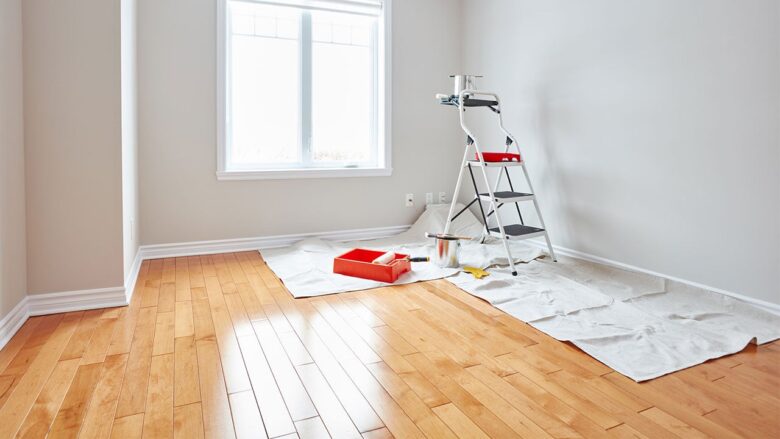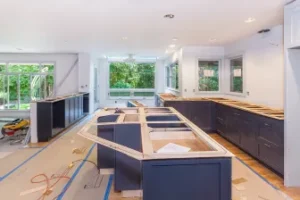One of the most common mistakes people make when remodeling on a budget is not creating a thorough plan. A lack of a plan can result in budget overruns, especially when resources are limited. A thorough plan should include a schedule, a step-by-step list of tasks, and an overview of expected expenses. Without a strategy, it’s easy to lose focus, act impulsively, or overlook important details. Often, rushing into a remodel with only a general idea of what it will look like can lead to unnecessary purchases at the hardware store, wasted tools or materials, and inconsistent results. A thorough strategy will help you stay on track, prioritize the most important upgrades, and make smart decisions within your budget.
Creating an Inaccurate Budget
Especially when on a budget, many homeowners underestimate the true cost of a remodel. Stress from an unrealistically high budget can result in the abandonment of projects or the taking of shortcuts. Renovation costs can include shipping costs, permit fees, and in some cases even temporary housing, which is more than just the cost of tools and materials. Ignoring unexpected expenses during budgeting is another significant error. It is essential to research the typical costs for the work you are planning to do; therefore, compare prices from different suppliers and take into account possible mistakes or crises. An honest and well-prepared budget can guarantee financial control throughout your renovation, thereby preventing disappointment.
Trying to Do Everything Yourself Without the Necessary Skills
While DIY projects can save you money, overestimating your skills can lead to expensive repairs and annoying frustrations. Many people think they can handle every detail of a renovation themselves because they do not understand how difficult some jobs are. Projects that involve structural modifications, plumbing, or wiring often require specialized knowledge; attempting these projects without the necessary experience can lead to costly mistakes or safety hazards. Knowing when you can do a job yourself is just as important as knowing when to ask for help. It’s wise to start with simple tasks like painting or installing shelves; leave more complex jobs to experienced professionals. While you can save money in the beginning, misjudging your DIY skills can cost you more down the road if problems arise.
Use your Entire Budget Up Front
All too often, people make the mistake of spending most or even all of their money at the beginning of a budget renovation. Investing too soon in trendy materials, expensive tiles, or fancy accessories can leave you short of basic expenses or unexpected costs. During the renovation, hidden damage, old wiring, or problems behind the wall often come to light that require quick repairs and extra money. If you’ve already used up your entire budget, you may have to stop the renovation or compromise on major repairs. It’s crucial to plan your purchases carefully, prioritize the essentials, and set aside some money for the unexpected. By dividing costs wisely, you’ll ensure the project runs smoothly and stay flexible.
Ignoring Permit Requirements
While skipping permits may seem like an easy way to save time and money, it can be a costly mistake. Many types of renovations, especially those involving structural, plumbing, or electrical work, require formal approval from local authorities. If you renovate without the proper permits, you could be fined, forced to walk back work that has been completed, or face problems selling your home in the future. Permits protect you and future residents by ensuring that renovations meet building codes and safety requirements. While obtaining permits can be time-consuming and expensive, the legal certainty and peace of mind they provide far outweigh the risks of ignoring them.
Following Trends Over Function
It’s easy to make renovation decisions based on the latest design ideas you see online or in publications. But focusing too much on modern design at the expense of practicality can be a big mistake when doing a budget remodel. While trends change, your home needs to adapt to your daily life. Spending money on flashy details that don’t improve practicality or comfort can lead to regret. It’s wise to focus on timeless design and functional improvements that meet your daily needs and add value in the long run. If a stylish room doesn’t have enough walk-in or storage space, you’ll have a hard time being satisfied in the long run. Since every dollar counts, a smart remodel should prioritize comfort, convenience, and sustainability.
Conclusion
Budget remodels can definitely work if you’re prepared and have reasonable expectations. Making the most of your resources depends on avoiding common mistakes like inadequate planning, unreasonable budgeting, and hasty decisions. Research is essential, and you need to be honest about your options and make smart, value-driven decisions throughout the process. Avoiding unnecessary worry and regret depends on investing time in planning your move, tracking your expenses, and focusing on your goals. By learning from these common mistakes, you can create a satisfying renovation that stays within your budget and delivers lasting results. A well-executed renovation requires only a clear vision, careful choices, and a pragmatic approach, not a giant budget.
FAQs
1. What are the most common mistakes people make when remodeling on a budget?
Starting without a clear budget or strategy is the primary mistake, as it often leads to overspending and an unfinished project.
2. How do I avoid overspending on my renovation?
To achieve your financial goals, create a thorough budget, track every item, and set aside some for unexpected expenses.
3. Is DIY always the best way to save money?
Not always. While you can save money by doing it yourself, it’s important to know your limitations and hire professionals for jobs that require specialized knowledge.
4. Do I need a building permit for a minor remodel?
Yes, it depends on the specific project. While some minor changes may not require a permit, any changes involving plumbing, electrical, or structural modifications generally do require a permit.
5. What should I prioritize for a budget-friendly remodel?
Instead of focusing on the trendy but useless items, focus on the renovations that will have the biggest impact, such as repainting, replacing lighting, and making functional repairs.




